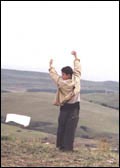 It would be unfair to place the burden of starting of new cinematic movement on the shoulders of Koktebel, the apparently unassuming feature debut of writer-directors Boris Khlebnikov and Alexei Popogrebsky. But if there is going to be such a thing as a New Russian Cinema, then their film provides a decisive direction. A road movie set in the countryside between Moscow and Crimea, Koktebel (the name of a Crimean city), focuses on the relationship between a father and son escaping from bad memories in Moscow.
It would be unfair to place the burden of starting of new cinematic movement on the shoulders of Koktebel, the apparently unassuming feature debut of writer-directors Boris Khlebnikov and Alexei Popogrebsky. But if there is going to be such a thing as a New Russian Cinema, then their film provides a decisive direction. A road movie set in the countryside between Moscow and Crimea, Koktebel (the name of a Crimean city), focuses on the relationship between a father and son escaping from bad memories in Moscow.
The precision of its psychological observations are set against a carefully evoked landscape in various stages of development. Similarly, the father and son meet with characters who are also in various stages of development, each one’s age dictating, to some extent, his or her personality and outlook. But these characters are not necessarily mere products of their age; Khlebnikov and Popogrebsky allow for the possibility, if not necessarily the actualization, of transcendence in all cases.
These qualities make Koktebel a Russian film in a fundamental way. To compare it to films from other national cinemas would be to overlook its essential characteristics and thus to miss out on all that the movie has to offer.
An unnamed Father (Gleb Puskepalis), who looks to be in his late 30s, leaves Moscow with his 11-year-old son (Igor Chernevich), to escape a guilty past that includes the death of his wife and years of profound alcoholism. He hopes to make it 200 miles south to Koktebel where his sister will, he presumes, help him raise his son and get started in his new life. (A Russian critic who served on a Moscow Film Festival jury with me objected to the fact that the Father left Moscow despite having a well-paying job as an engineer job; it is extremely unlikely that any Russian would leave behind such economic security for an insecure future, regardless of the circumstances. Despite this objection, she liked the film very much.)
But they have no money, so they have to walk, hitchhike or hop freights, the last of which prompts their first encounter with a stranger. After one night’s journey they’re awoken by a yard guard who hammers away at the side of their box car with a stick. Fearful, they follow the man to see what will happen.
The writer-directors had already expressed the father and son’s relationship with the Russian landscape. The two are seen walking alone across a meadow, already a violation of a cinematic tradition which, inevitably and even when non-ideologically, inserts protagonists within a crowd. Now the two interact with a third person in similarly intimate terms. This train yard worker appears to be in his 40s, thus a man who was born and educated under strict communism, witnessed its fall, and has suffered under the political turmoil and economic harshness that has ensued for over a decade (any Russian would know this; unfortunately, American viewers would not).
But this life has not embittered him, but extended his empathy, and Khlebnikov and Popogrebsky show in an extended vignette of suspense and relief filled with humanity.
The traveling shots continue to exist as far more than transitional episodes. The camera watches father and son at a respectful in long shot, unwilling to intrude on their sacred relationship. We watch their connection express itself in purely physical terms, as well as verbal, and the natural surroundings form a cathedral-like setting. The spiritual nature of the father-son bond emerges easily and genuinely.
The next two country-dwellers with whom the boys meet up provide less satisfactory outcomes though in utterly different ways. The first is a bad-tempered and dishonest retired army officer who offers the father some much-needed cash if he’ll fix the roof on the officer’s comfortable two-story country retreat. The officer is an old man and a drunk, a holdover from the Stalinist era, still fond of its ideology and bitter over its fall. He cajoles the father into taking a drink, starting both on a catastrophic bender.
(Viewers should know at this point in the movie that Russian citizens, aside from needing external passports to travel abroad, are required to carry internal passports for traveling within Russia. If you’re caught without one, you can end up in jail.)
The final encounter is with a beautiful young doctor, a contemporary of the father, who takes the pair in. She’s obviously in synch with her guest’s sensibilities, and since she’s single and lonely out in the country, it’s no surprise that the two begin to fall for each other. While this seems like a turn for the good, it enrages the son, who sees both an intrusion on the only loving relationship in his life and a betrayal of his late mother.
There are more twists and adventures yet to come in what looks like a "little" film but which might actually be a quite significant one. The more one examines Khlebnikov and Popogrebsky’s work, the more one is impressed by its depth and style. Acute on psychological, spiritual and stylistic levels, Koktebel augurs at least promising careers. Let us see if it promises even more.
